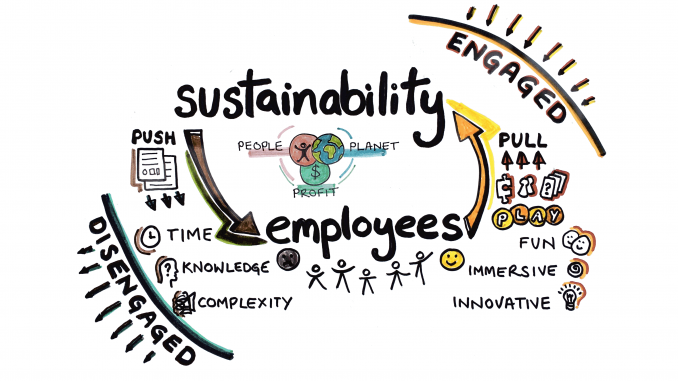
Sustainability is an aspect of business that is perceived by employees as complex, confusing and time consuming. A topic that is still too often ‘siloed’, leaving employees disengaged and lacking interest to understand the full picture.
But there is hope.
In a recent survey, play was named as a high potential tool to engage employees in sustainability.
Sustainability is key to future business success

Businesses get it.
94% of CEOs say sustainability issues are important to the future success of their business[1]
The sustainability message has been heard, loud and clear, at the top level of big corporates. CEOs are beginning to see the importance of working towards running their businesses in ways that:
- meet the needs of the present without compromising the ability of future generations to meet their own needs
- balance the pillars of Planet, People and Profit
- contribute to a common goal of a better tomorrow
But sustainability is not a destination; it is a journey. Every company is at a different stage on their sustainability journey, they will be following different paths, have different priorities and use different language… Corporate Social Responsibility (CSR), Corporate Social Innovation, Sustainability, Purpose…. and that’s ok.
The challenge is no longer “why” sustainability. The challenge is now “how” to implement sustainability in an impactful way.

Sustainability touches all areas of business and operations, from product level to company level, from employees to customers and from local to global issues.
Every company is unique and the context in which they operate affects the sustainability challenges they face – CO2, waste management, gender equality, plastic use, energy consumption, human rights issues in supply chain, biodiversity …the list goes on.
One thing is common though…wherever companies are on their journeys they will advance more quickly by getting employees from across their business engaged and on-board early on.
The challenges of engaging employees in sustainability

So if the key to creating a successful sustainable company is to get all employees – from top management to shop floor workers – personally engaged in the company’s sustainability goals. Why isn’t this happening?
We conducted a survey to find out more.
Whilst sustainability may now be seen as important, 50 % of respondents stated that sustainability isn’t well integrated in the companies they work for and that companies lack solutions to make sustainability more accessible and relevant to employees.[2]
It is also difficult to break silos and make sustainability a priority for all employees regardless of their roles and responsibilities. Only 15% of respondents told us their companies had identified ways to make sustainability part of every employee’s role.[3]
We learnt that the top three challenges companies face in engaging employees in sustainability are time, knowledge and complexity.[4]
1: Employees don’t have enough time
Projects, meetings, calls, reports, presentations, more meetings. We are all getting busier and busier, always connected, available at any time of day, with deliverables that were due yesterday. Employees may feel they don’t have time to do their own job, let alone reading their company’s latest content heavy, complex and lengthy sustainability report.
2: Employees don’t have sufficient knowledge
Sustainability is still seen as a specialist topic. Whilst the key principles are common to most businesses, many aspects are very industry specific – a shipping company will have very different sustainability focus than a fashion company or a medical devices company. It is important that there is a common understanding that the goal of engaging employees is notfor them to become sustainability experts. The goal is to increase general awareness of sustainability, how it relates to the company they work for and how they can take action for sustainability within their own roles.
3: Employees find sustainability complex
Sustainability brings a whole new level of jargon, with its three pillars Economy, Environment and Society (or alternatively Planet, People and Profit). Then there is the United Nations’ Agenda 2030 with its 17 Sustainable Development Goals, 169 targets and 231 indicators. Climate change, carbon footprints, CO2 emissions, carbon sinks, causes and effects …. Layer that with the company’s approach, language and priorities, and no wonder sustainability seems overly complex and off-putting.
In a world where sustainability is seen as complex, where employees are disengaged, where the need for change is urgent, doing the same as we’ve done before simply doesn’t work. As Einstein once said “insanity is doing the same over and over again”.
Could play be new way to engage employees in sustainability?

Games are structured forms of play and well-developed immersive games are a perfect starting point for experience and enquiry driven learning about sustainability.
Harnessing play for sustainability can help companies to overcome the challenges of time, knowledge and complexity through providing a fun and engaging environment along with games that can captivate, excite and motivate players whilst instinctively conveying meaningful content in a time-condensed and simplified way.
Two sustainability games that illustrate this new way of engaging employees are:
The SDG 2030 game a thought-provoking facilitated multi-player card-based game developed that simulates what the world could look like in 2030. The game engages participants in exploring how we can achieve a more balanced world and the consequences of our actions. Playing the game and reflecting on it afterwards, participants realise that everything is interconnected, that we can change the world when we work together and that even seemingly small actions can have a big impact. Players leave with an understanding of the importance of the Sustainable Development Goals and that we all have a role to play.
In the Loop is a serious game that helps players take the first step in identifying what it means to move towards a more circular economy. The board-based game simulates complex, global resource supply chains and triggers players to find solutions in a fun and engaging way. Players take on the role of a manufacturing company and collect resources and build products, but we live in an unpredictable world and players face difficult strategic decisions about collaboration, investments and business models as they navigate the game.
Why is play so powerful?

Freedom of play – When we play, as adult or children, we step into a new world, a world of opportunities with no boundaries to our creativity. There is no right or wrong and risks are minimised. Play allows us to explore, experiment and question different approaches and ideas and learn from this experience.
Create an experience – As we say, if a picture is worth a thousand words, an experience is worth a thousand pictures. Games are memorable shared experiences that can bring people together, change perspectives, shifting behaviours and inspire action.
Bring people together – In every play situation, there is an element of competition as well as a shared experience. When applying play to sustainability, people get together around a common goal, which is very powerful.
Change perspectives – Play helps all of us to look at the world from a different perspective and sustainability themed games can spark real aha moments that demonstrate to players that alternative approaches are required and that even small actions can have an important impact on the big picture.
Action beyond play – Awareness without action is pointless. Powerful sustainability games spark individual and collective reflection and inspire participants to co-create solutions and take action.
Play is a key enabler for sustainability
For companies who want to bring their sustainability goals to life and embed sustainability across their organisation, play has the potential to be a truly transformative tool to engage employees in sustainability.[5]
Let’s get more people playing with purpose at work, then the ripple effect of that play will create positive impact for both planet and people as well as for business.
[1] United Nations Global Compact – Accenture Strategy CEO Study on Sustainability September 2019
[2] Results of a survey conducted by Co-CREATE ImpACT in December 2019 / January 2020
[3] Results of a survey conducted by Co-CREATE ImpACT in December 2019 / January 2020
[4] Results of a survey conducted by Co-CREATE ImpACT in December 2019 / January 2020
[5] 87% of respondents to a survey conducted by Co-CREATE ImpACT in December 2019 / January 2020 stated that they would consider using play as a tool to engage employees in sustainability in the future.
- #Play4Sustainability: Engaging employees in sustainability through play - 19th April 2020





Be the first to comment